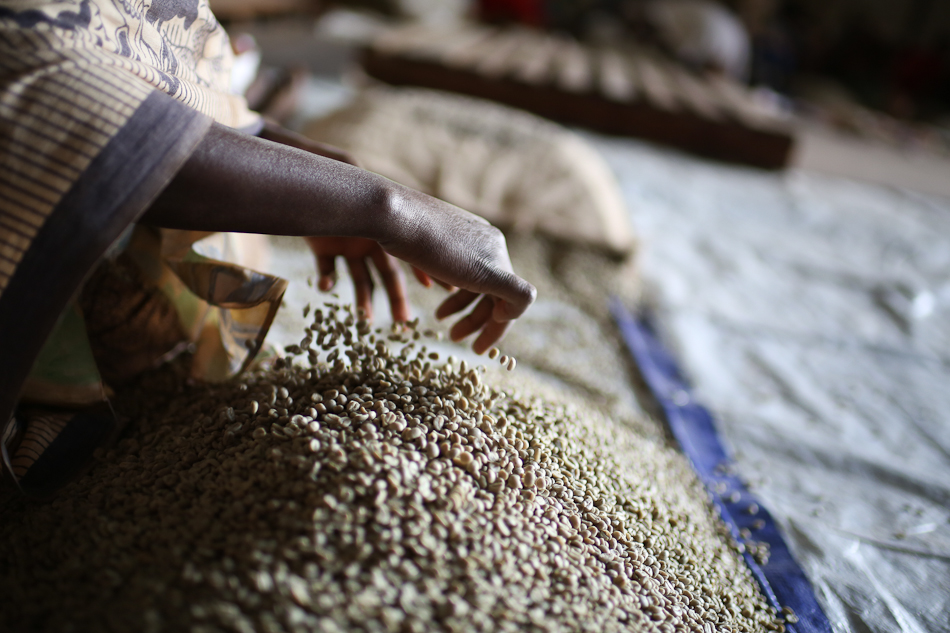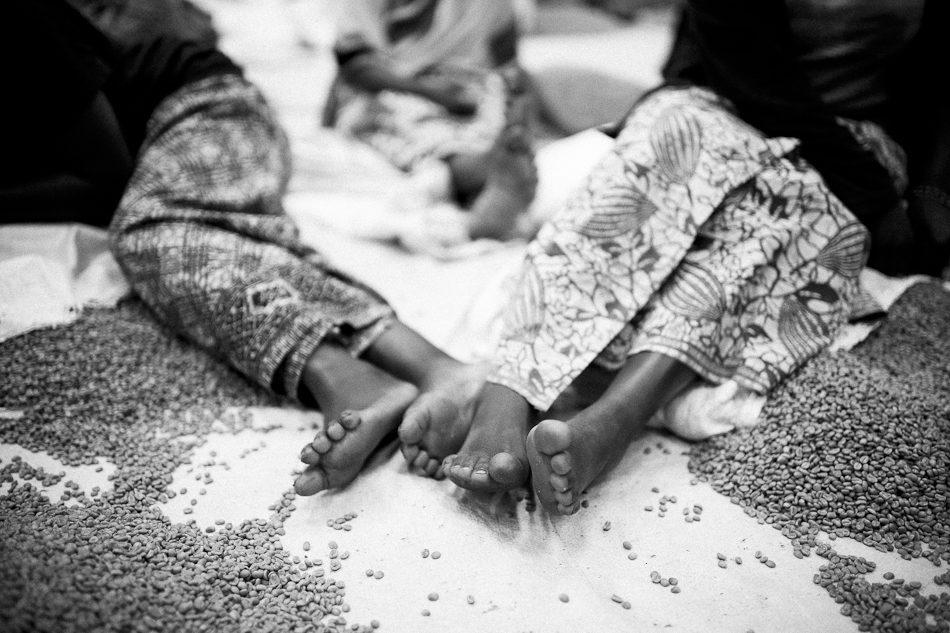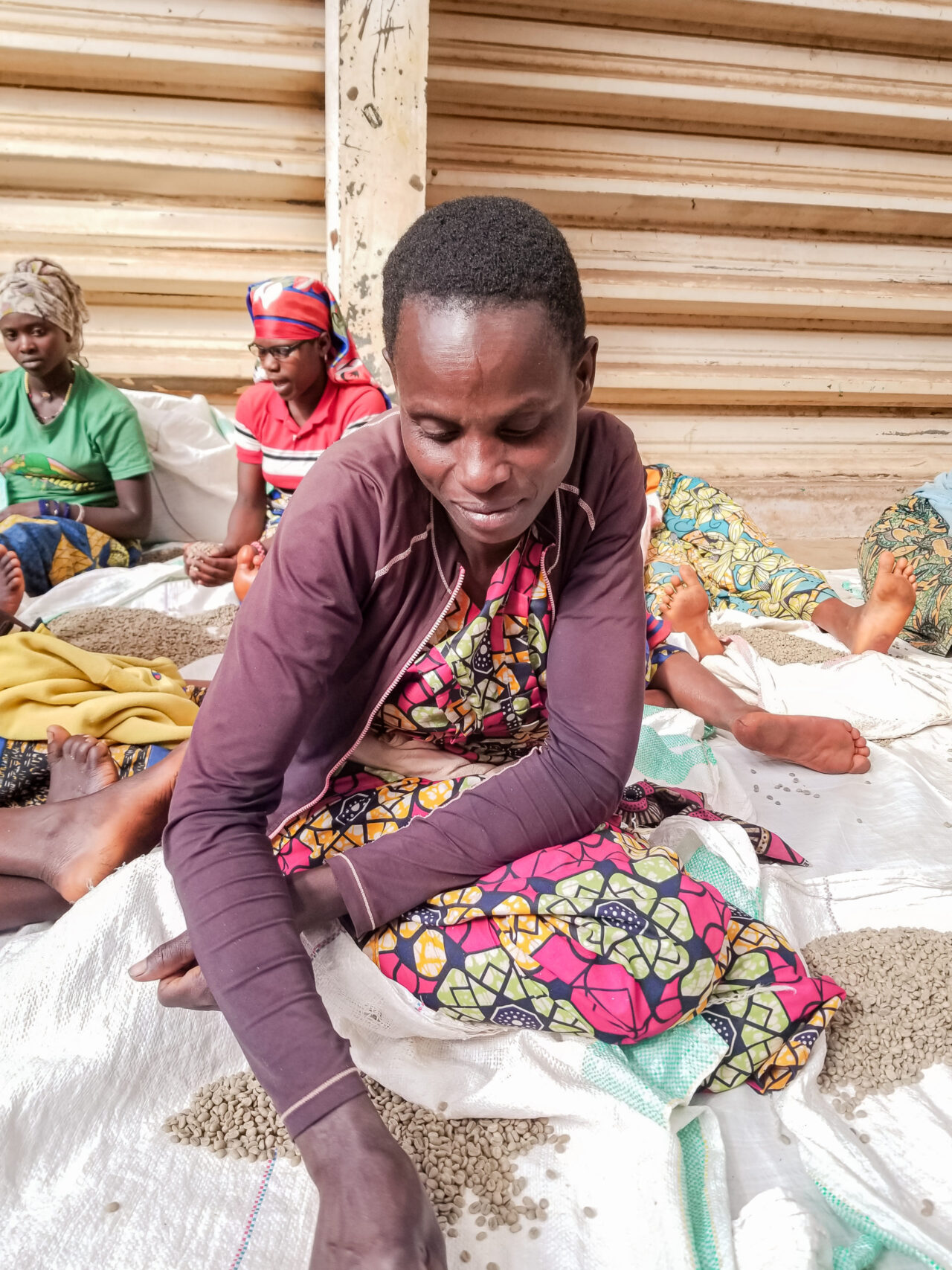In our most recent blog post we presented a brief overview of the Dry Milling process; the final processing step before coffee is placed into bags, ready for export. In that post, we mentioned Hand Sorting as a critical and final stage in the Milling process. Whereas that last post was focused on the bullet point steps of the Dry Milling process, our aim in this post will be to focus more on the humanity behind the final Hand Sorting step.

These are, after all, human hands that are performing the Hand Sorting. We often think of the supply chain beginning with farmers, ending with consumers, and containing a few other agents in between (exporter, importer, roaster). While this is not inaccurate per se, it is also not nearly complete. The supply chain also contains coffee pickers, washing station staff, warehouse staff, truck drivers, ship operators, forklift operators, and -of course- hand sorters (to mention only a few). In fact, while the plight of coffee farmers is sincere and deserves our utmost attention, it could be argued that it is these less-visible individuals in the supply chain that are most in need of advocates. A farmer could, after all, get paid very well for their coffee, making for a great transparency report on the consumer side; meanwhile, the individuals that picked that coffee could have received an abysmal wage and terrible working conditions. Sadly, we can share that these things do happen around the coffee-producing world. Burundi, along with many other East African nations, is somewhat insulated from this by the very fact that the farmers growing the coffee are frequently also the individuals picking the cherries. That said, Burundi is not immune from inequities within the supply chain – far from it.
Before getting much further, we should address some basic facts surrounding Hand Sorting.
Firstly, why is it done? It does seem that the many, many stages the coffee passes through at the Dry Mill would be sufficient to clean the coffee. Between sorting by size, density, and finally optical color sorter, you would think the coffee could come out of the milling process amazingly clean. And it does – relatively speaking. When compared to the product that goes into the mill, the finished product is remarkably clean. That said, the standards surrounding physical defects in green coffee have gotten extremely strict for specialty buyers. Overall, this is a good thing. It leads to better-tasting coffee that is easier to roast evenly, and that stays tasting good for a long period of time. If Specialty Coffee is ever to succeed in its purported goals, these are really important qualities for the coffee to possess. As such, hand sorting is critical for getting the coffee as clean as possible.
In truth, the optical sorter could be used to greater effect, to the point of eliminating most of the need for hand sorters. The optical sorter has a programmable sensitivity. When a seed passes in front of the laser that is outside of the programmed range (either too light or too dark in color) a puff of air shoots the unwanted seed into a reject pile. The challenge is, if the optical sorter is set to such a sensitivity that everything coming out is directly ready for export, it will very likely have also taken out a lot of extra, good-quality coffee. Furthermore, when the puff of air dispenses with the unwanted seed, it is not so selective that it only removes one seed. The coffee is moving very fast in front of the laser and each puff of air removes quite a few seeds.

Secondly, who employs the hand sorters? The hand sorters are not Long Miles employees. They are employed by the Dry Mill, which we do not in any way own. While we are allowed to have staff there to direct and oversee the hand sorters, we do not set or pay their wages nor do we ultimately decide who gets work and who does not.
There are 335 people working as a part of the hand sorting team this year. 320 of them are women, 15 are men. All 320 women work in hand sorting. Three men work with them. Nine men work carrying bags and three men work supervising the hand sorters. Joy Mavugo, a Burundian and critical member of the Long Miles Burundi team says that there are more women doing this work because the other jobs available at the dry mill and elsewhere are too physically challenging. While there may be some truth to this, I will also share that, having spent a significant amount of time in many coffee-producing countries, it is no secret that women are the glue that binds within communities. Willing to take jobs that men find below them, women often support families through whatever means necessary. Hand sorting at Dry Mills seems to be one such job.

Recently, Joy spent time with the hand sorters as they worked; hearing their stories and asking them questions. Joy shared some background on two individuals in particular – Beatrice Nhimirimana and Melance Niyiragira.
Beatrice Nhimirimana is from Gitega, where the Dry Mill is located. She has been working as a hand sorter at the Dry Mill since 2019. Previously, her friends Alice and Yvonne were working as hand sorters and would ask if Beatrice was interested in joining them. She would always say no. Slowly, however, Beatrice noticed that he friends started to purchase livestock. They told her that the money came from their work as hand sorters. They said that they could use this money without asking permission from their husbands. Beatrice, who spends much of her year cultivating crops such as rice, beans, sweet potatoes, cassava, potatoes, and cabbage, never had spending money as the crops she grew were only for consumption, not for sale. Furthermore, at the beginning of the dry season, there is not much work for women because it is not time to harvest. As such, Beatrice decided to apply for work as a hand sorter and on her second attempt was given a job.
There are a number of things Beatrice likes about working in the Dry Mill. Firstly, she enjoys doing something apart from working in the fields. Secondly, she likes learning new skills. Thirdly, she enjoys spending time with so many people. Never before has she been with hundreds of people at a time. Finally, she enjoys earning her own money. Beatrice told us that, “after touching money, the thirst for it stays.”

The money Beatrice (pictured) has received from working at the dry mill has allowed her to support her family. Beyond this, the work is easier than her work cultivating crops in the field. In fact, this leads to the only issue in her eyes, “when the work at the mill is finished I go back to the fields and I need more energy. I lose it all sitting all day at the Dry Mill.”
The current pay for hand sorters is 2,000 Burundian Franc per day (at the time of writing this blog post that is just under $1 USD). Beatrice told us that they need more money as everything is getting more expensive. On the other hand, she prefers to make this money rather than stop working. Beatrice told us that she believes she will have many days of work as she has never seen sch a large harvest in her life.
We also spoke with Melance Niyiragira. Melance told us that, “hand picking is for women because it doesn’t require much energy.” He has been working at the mill since 2006. Back then he was carrying coffee bags. He did this work for many years, but the heavy bags (60kg each!) began to cause pains in his chest, pains that continue to this day. He needs this work to survive, but he was not shy in telling us that it makes him uncomfortable spending days sitting with women.
Gender seems to be a particularly complex topic in Burundian culture. In truth, it is a topic that I (David Stallings) struggle to feel confident/comfortable writing about. Not because the topic makes me uncomfortable – in any way. Rather, I am a white, cisgender male and acutely aware of the fact that it is exactly that demographic that has so disastrously and wrongfully dictated/written history. I do not want to shy away from the statements above that delineate gender roles even though I know they can be uncomfortable to read, nor do I want to express them in a way that makes it seem that I/Long Miles share these perspectives. In talking about this with Joy Mavugo, she tells me that it is as much a class issue as it is a gender issue. That educated Burundian women “know the truth, they know how to fight for their rights,” and that for them, “there is no limit – they are in all industries, in the government, they are leaders.” For those women who are not educated, however, Joy says that “they are excluded from many things as they live in the culture of an older generation that believes the family wealth belongs to the men.”
It would be wonderful to have Joy write a post on this topic. She is an amazingly insightful and intelligent individual who has a great perspective on life in Burundi. If this is something you would be interested in reading, or if you have any thoughts on/questions about this post, please email info@longmilescoffee.com or comment below!



Yes, it would be very interesting to hear from Joy in a future post.
Amazing and agreed! Thank you, Deb.